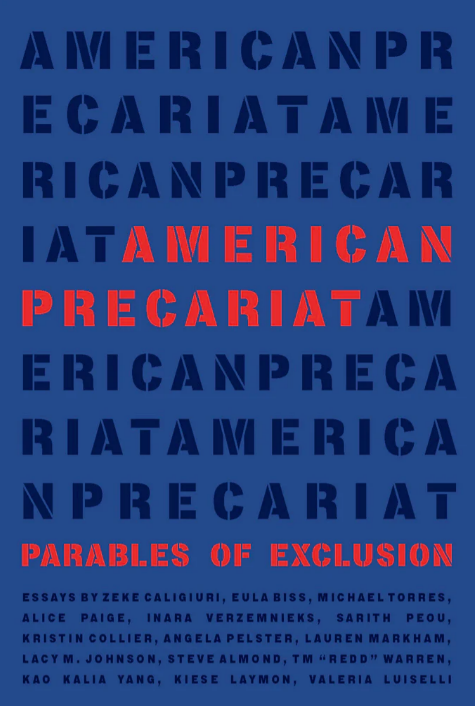Voices of the Incarcerated - American Precariat
“This is a volume edited by the imprisoned, because the history of class has always been written by the powerful.”

American Precariat: Parables of Exclusion, represents a partnership between Coffee House Press and the Minnesota Prison Writing Workshop with an editorial board consisting of twelve writers from the prisoner-created collectives of the Minnesota Correctional Facilities at Stillwater, Faribault, and Moose Lake. This collection of essays seek to break through the silence around class and detail the risks that our material conditions leave us no choice but to take and shares stories of the unseen and the unspoken, articulating the lines of our division. In doing so, it offers healing for some of the world’s fractures.
The book features 15 essays commenting on the complexity and fluidity of class and caste systems in the United States. There is a growing class, especially in the U.S., not characterized by politics, race, or religion, but by economic uncertainty and lack of stability. Defined by the British economist Guy Standing as “the precariat,” this class cuts across broad swaths of the population: immigrants, prisoners, and gig workers, but also college graduates, homeowners, and artists. “We build community,” writes Caligiuri, “because we can’t expect, demand, or control the machinations of the captivity business.
Zeke Caligiuri, one of the editors on American Precariat, recently did an interview about the release of the book and the collective of editors that contributed to the literary project.
The twelve members of this book’s editorial staff are a small group of the much larger collectives that have grown up in our state, and throughout the country, in the sense that writers and artists always find each other in these kinds of spaces. There are creation stories that connect to make this community possible.
Time in the life of a writer, or a prisoner, is an emergency. Incarcerated writing communities provide for us what we can only assume they offer to non-incarcerated writing communities: peer support, friend- ship, competition, rivalry, and shared stakes in the success of their members. These communities offer reminders of time and the emergencies time represents. Classes get canceled and cut. In 2005, our whole education department shut down for months and every computer in the joint was wiped and scoured. Stories, essays, poetry, and even an anthology of our work disappeared from the universe. There are lockdowns, seizures of materials, intentionally, and sometimes collaterally. There are surprise transfers that leave us without computer access, and we must figure out how to keep the things we need most. We, who are working hard to mend some of the wounds in the social and familial fabric of our lives, live with a stopwatch to create evidence that will show something redemptive within us.
Read the full interview with Zeke Caligiuri -->> "How a Collective of Incarcerated Writers Published an Anthology From Prison" at Electric Literature.
You can order a copy of American Precariat: Parables of Exclusion from Coffee House Press.
If you happen to be in the Twin Cities area, you can attend the book launch for American Precariat at the Hook and Ladder Theater (3010 Minnehaha Avenue) in Minneapolis tonight from 6p-10p. Doors open at 6p, reading begins at 7p, discussion to follow.










